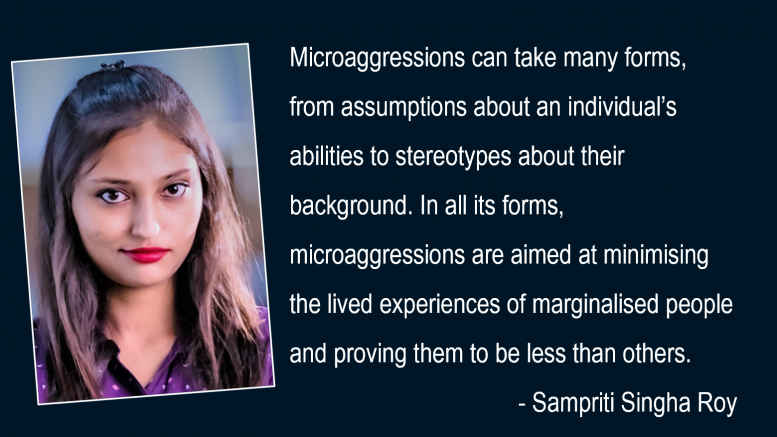Microaggressions are everyday slights and exclusionary behavior that stymie an individual’s motivation and productivity at work.
Psychologists often describe microaggressions as ‘death by a thousand cuts’— a metaphor that’s the title of a paper on the health implications of black respectability politics by Hedwig Lee and Margaret Takako and the subtitle of an article by Kevin Nadal on the impact of microaggressions on L.G.B.T.Q. youth.
The term, originally coined by Harvard psychiatrist Chester M. Pierce in the 1970s, owes its current definition to Derald Wing Sue, a professor of counseling psychology at Columbia University. Sue defines microaggressions as ‘everyday verbal, nonverbal, and environmental slights, snubs, or insults, whether intentional or unintentional, which communicate hostile, derogatory, or negative messages to target persons based solely on their marginalised group membership.’ Simply put, microaggressions are those subtle behaviors that tell certain individuals they are less than others.
On the surface, microaggressions may seem somewhat innocuous— especially when compared to outright discrimination and violence. In fact, its very nature makes tackling microaggressions an uphill battle. Along with the frustrations of being made into a victim creeps in confusion and self-doubt: My otherwise good-natured boss thinks I need my husband’s help to operate Zoom, but should I just let it slide? My team lead says folks with ADHD cannot be good writers, but wouldn’t confronting him mean outing myself? I was asked to ‘man up’ but is it worth taking action on, or should I just act like nothing has happened to keep the peace? If any of this happened to you, know you are not alone.
Research shows that microaggressions can cause a world of harm. A study by the National Institute of Health found a direct correlation between microaggressions and depressive symptoms, while another article highlighted its effect on employee burnout. The point is, the impact of microaggressions is not so micro. From invalidating marginalised people’s identities and lived experiences to demeaning their ideas and perspectives and relegating them to an inferior position in teams, they create deep inequities and scars that last a lifetime.
Despite all efforts to keep the peace and tendencies to push things under the rug for the sake of career progression, it’s crucial to tackle instances of microaggressions at work and in life. While responding to such behavior might seem potentially risky, it’s possible to minimise their impact with the proper understanding, education, and strategies in place.
Five ways to deal with microaggressions at work
Understand the impact of microaggressions and share your learnings
Microaggressions can take many forms, from assumptions about an individual’s abilities to stereotypes about their background. In all its forms, microaggressions are aimed at minimising the lived experiences of marginalised people and proving them to be less than others. Since it directly affects job satisfaction and productivity, it’s essential to understand its impact on individuals and the workplace as a whole. Education goes a long way in tackling deep-seated biases.
Speak up and address the behavior head-on
Often, microaggressions stem from ignorance and lack of understanding by well-meaning individuals. To counter such behavior, it’s essential to address it directly. For example, if a coworker makes a comment that minimises your experiences through harmful stereotypes, it is important to speak up and let the person know their behavior was hurtful. While this can be difficult, creating an environment where such behaviors won’t be tolerated is necessary.
Seek support from HR and leadership
Sometimes addressing microaggressors yourself can seem uncomfortable—which is fine. Another strategy is to seek the help of a supervisor or someone from HR. In such a scenario, try to document any and all incidents and bring them to the attention of someone in a position of authority. This will help hold the individual accountable and make sure that they realise the impact and consequences of their behavior and actions.
Join or start an employee network group against all kinds of discrimination
Employee network groups can be a safe space for employees who have experienced any kind of discrimination. They can also help individuals feel less isolated and more empowered to address microaggressions. The key is to surround yourself with supportive colleagues and allies who take the time to understand what you have gone through and provide emotional support. This can provide a sense of validation and support and help combat the invalidation resulting from experiencing microaggressions.
Prioritise your safety and well-being
While advocating for yourself is key, prioritising your safety and well-being is absolutely necessary. Not all workplaces are created equal, and neither are microaggressions. Depending on the circumstances, it may be best to disengage from the situation and seek the support of a trusted colleague or mentor. Remember, dealing with microaggressions can be emotionally draining. Self-care can sometimes be as simple as having a few friends whom you can discuss common lived experiences with. It’s important to recognise what works for you and learn to draw healthy boundaries that help you thrive.
Sometimes, workplace culture has a lot of bearing on how certain behaviors are allowed. To foster a healthy working environment, employers must explore ways to prevent microaggressions and hurtful stereotypes by providing reasonable accommodations, making diversity and inclusion training mandatory and actionable, and actively building a culture of respect and empathy.
This world we live in should be built equal, but it is not—yet. It is systemic inequalities that make navigating microaggressions so invalidating. Still, by understanding and educating others about its impact, developing strategies to counter such acts, and advocating for inclusive standards at work, we can work toward building an environment where everyone gets to thrive.
The views and opinions published here belong to the author and do not necessarily reflect the views and opinions of the publisher.



Be the first to comment on "Breaking away from microaggressions at work"